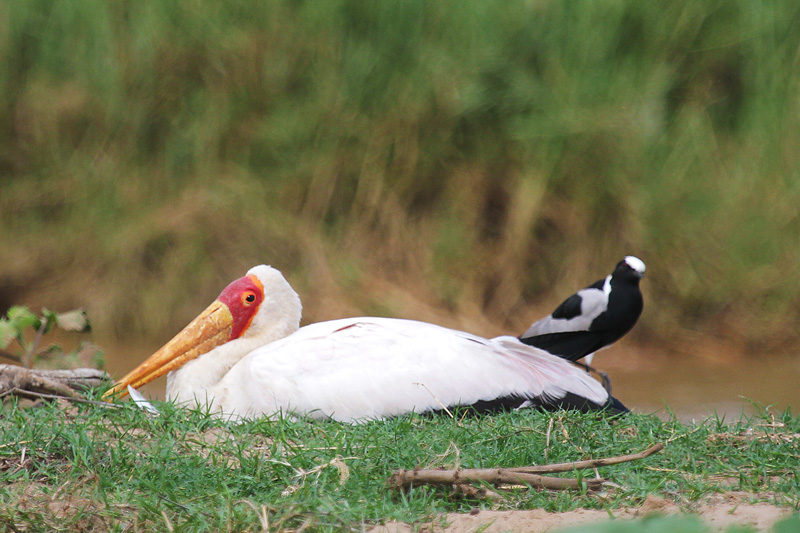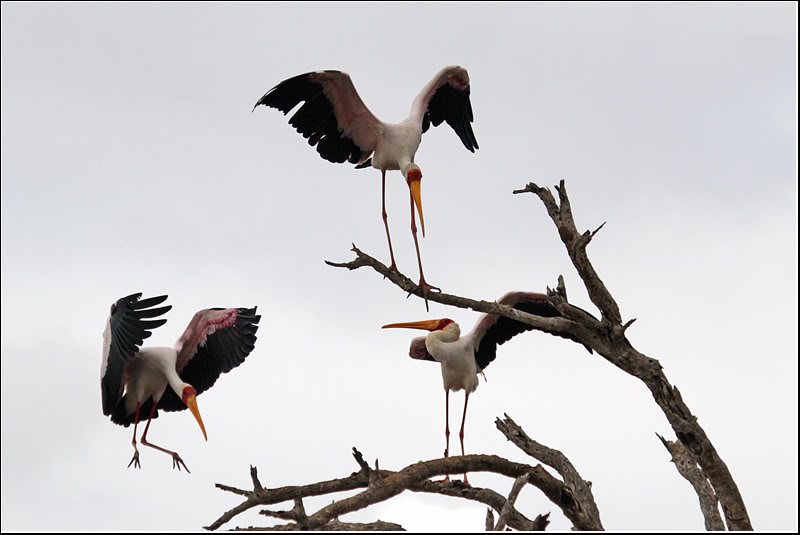
Storks (Family Ciconiidae) - Bird of the Month: March 2013
- Amoli
- Posts: 6032
- Joined: Fri Jun 01, 2012 4:30 am
- Country: South Africa
- Location: Kempton Park
- Contact:
Re: Stork - Bird of the Month: March 2013
I love the name of the Yellow-billed stork in Afrikaans..
nimmersat - never tired.. -O
I have only seen a Yellow Billed Stork once...
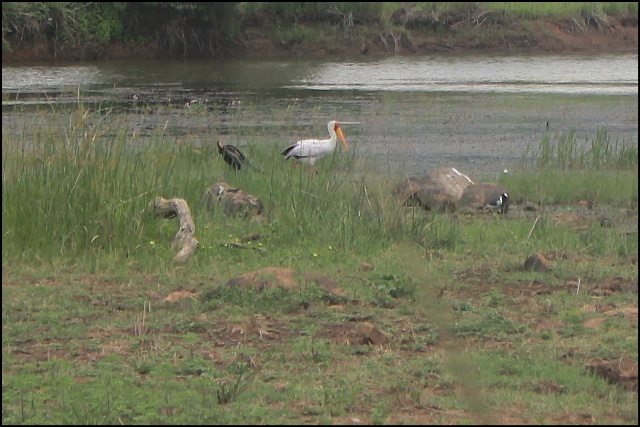
Pretoriuskop
Satara
Shingwedzi
20-30 Dec 2014
Satara
Shingwedzi
20-30 Dec 2014
Re: Stork - Bird of the Month: March 2013
Juvenile Yellow-billed Stork & Hamerkop.
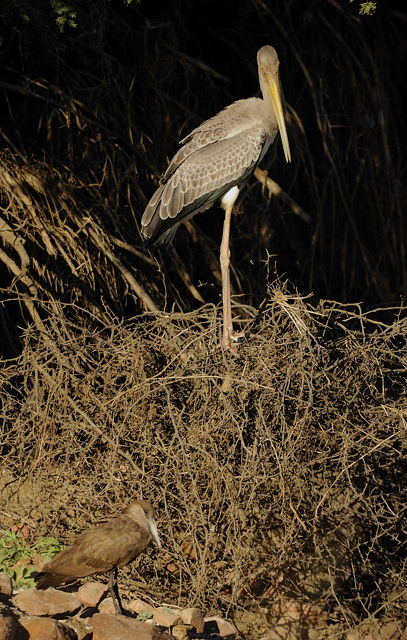

Dewi
What is the good of having a nice house without a decent planet to put it on? (H D Thoreau)
What is the good of having a nice house without a decent planet to put it on? (H D Thoreau)
- nan
- Posts: 26436
- Joined: Thu May 31, 2012 9:41 pm
- Country: Switzerland
- Location: Central Europe
- Contact:
Re: Stork - Bird of the Month: March 2013
Yellow-billed Stork/Tantale Ibis
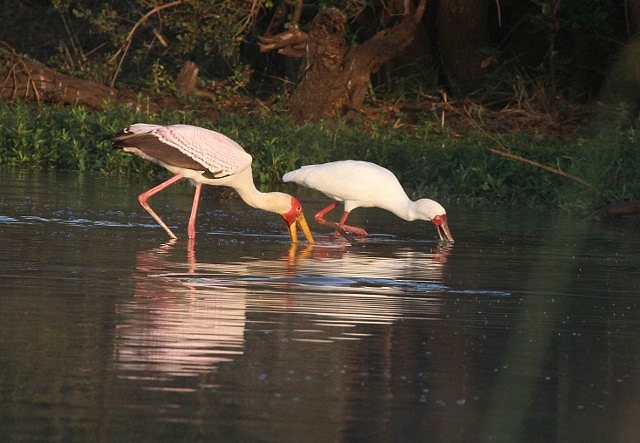 + African Spoonbill
+ African Spoonbill
Kruger National Park
 + African Spoonbill
+ African SpoonbillKruger National Park
Kgalagadi lover… for ever
https://safrounet.piwigo.com/
https://safrounet.piwigo.com/
Re: Stork - Bird of the Month: March 2013
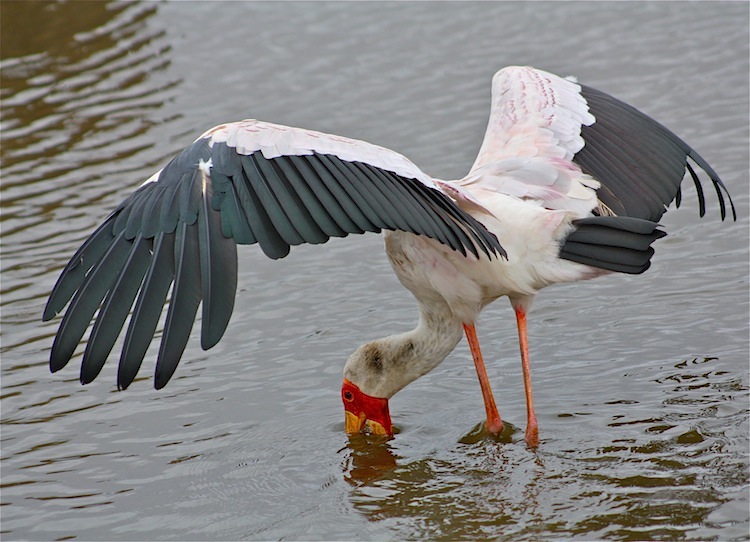
Another feeding strategy is known as "canopy feeding" or "shadowing", wherein the wings are spread, creating a patch of shade which entices fish, etc. into the mock shelter. It is also thought that it is used to reduce glare.
Re: Stork - Bird of the Month: March 2013
African Openbill Anastomus lamelligerus
Order: Ciconiiforme – Family: Ciconiidae
Size
Length: 80-94cm. Weight: 1-1.3kg
Description
Medium-sized stork with highly specialized bill with the lower mandible curved and separated by a gap from the upper mandible. Both adults are similar, with male larger than female. The plumage is blackish plumage glossed green, purple and brown. The large bill is brownish-horn, paler towards the base. The mandibles show a wide gap between them of about 5-6mm, and join only at tip. On the almost straight upper mandible, there are several small columnar pads, about 20-30, which help the bird to grip the shell and then, to extract the mollusc. Bill-clattering, a feature on most other storks, cannot be performed because of this feature. Lamelligerus is a Latin phrase for 'a small, thin, metal plate' which refers to the flattened feather shafts, especially on the underparts.
Eyes are grey with bluish lores and bare eye-ring. Legs and feet are blackish.
The juvebile is duller and browner, with pale feather tips on the upperparts. Its bill is almost straight, with narrower gap between the mandibles. The young develops the gap little by little with the maturity.
Distribution
The African Openbill is found in Africa, south of the Sahara, but it is infrequent throughout West Africa. It also occurs in Madagascar. In southern Africa, it is locally common in Mozambique, Zimbabwe, eastern South Africa, northern Botswana and northern Namibia.
Habitat
African openbills are found mainly in freshwater wetlands such as floodplains, flooded pans, marshes, ponds, swamps, streams, dams and lagoons. They may sometimes frequent moist savannahs and burnt grasslands, and occasionally streams with nearby tall trees for nesting.
Migration
This species is an intra-African trans-equatorial migrant making movements that are triggered by the rains.
Diet
The African Openbill feeds primarily on aquatic snails, but it also takes freshwater mussels. Its typical bill is adapted to its feeding behaviour. The bird detects the snail by sight and by touch, and catches it between the mandibles. Then, it introduces the lower mandible’s tip into the shell, in order to remove the operculum and to cut the strong muscle, and finally, it extracts the molluscs while the shell is held with the upper mandible tip against the ground. The African Openbill feeds singly or in small groups, walking slowly in shallow water, and digging into the mud with the bill. It may be seen on the back of grazing hippopotamus, waiting for snails disturbed by the huge animal.
Breeding
The African Openbill is monogamous. It nests colonially, often in mixed-species groups. Breeding period occurs in rainy season, between August and May, with peak in January-March.The African Openbill nests in colonies of varying numbers of pairs. It builds a relatively small nest of about 50 cm wide, a platform made with sticks and reeds, and lined with aquatic vegetation, sedges, grass and leaves. The female lays 3-4 oval, chalky-white eggs. Incubation is shared by both sexes and lasts about 25-30 days. At hatching, the downy chicks are black with normal bill. The gap will develop over several years. The chicks are fed by both parents, and fledge about 50-55 days after hatching.
Order: Ciconiiforme – Family: Ciconiidae
Size
Length: 80-94cm. Weight: 1-1.3kg
Description
Medium-sized stork with highly specialized bill with the lower mandible curved and separated by a gap from the upper mandible. Both adults are similar, with male larger than female. The plumage is blackish plumage glossed green, purple and brown. The large bill is brownish-horn, paler towards the base. The mandibles show a wide gap between them of about 5-6mm, and join only at tip. On the almost straight upper mandible, there are several small columnar pads, about 20-30, which help the bird to grip the shell and then, to extract the mollusc. Bill-clattering, a feature on most other storks, cannot be performed because of this feature. Lamelligerus is a Latin phrase for 'a small, thin, metal plate' which refers to the flattened feather shafts, especially on the underparts.
Eyes are grey with bluish lores and bare eye-ring. Legs and feet are blackish.
The juvebile is duller and browner, with pale feather tips on the upperparts. Its bill is almost straight, with narrower gap between the mandibles. The young develops the gap little by little with the maturity.
Distribution
The African Openbill is found in Africa, south of the Sahara, but it is infrequent throughout West Africa. It also occurs in Madagascar. In southern Africa, it is locally common in Mozambique, Zimbabwe, eastern South Africa, northern Botswana and northern Namibia.
Habitat
African openbills are found mainly in freshwater wetlands such as floodplains, flooded pans, marshes, ponds, swamps, streams, dams and lagoons. They may sometimes frequent moist savannahs and burnt grasslands, and occasionally streams with nearby tall trees for nesting.
Migration
This species is an intra-African trans-equatorial migrant making movements that are triggered by the rains.
Diet
The African Openbill feeds primarily on aquatic snails, but it also takes freshwater mussels. Its typical bill is adapted to its feeding behaviour. The bird detects the snail by sight and by touch, and catches it between the mandibles. Then, it introduces the lower mandible’s tip into the shell, in order to remove the operculum and to cut the strong muscle, and finally, it extracts the molluscs while the shell is held with the upper mandible tip against the ground. The African Openbill feeds singly or in small groups, walking slowly in shallow water, and digging into the mud with the bill. It may be seen on the back of grazing hippopotamus, waiting for snails disturbed by the huge animal.
Breeding
The African Openbill is monogamous. It nests colonially, often in mixed-species groups. Breeding period occurs in rainy season, between August and May, with peak in January-March.The African Openbill nests in colonies of varying numbers of pairs. It builds a relatively small nest of about 50 cm wide, a platform made with sticks and reeds, and lined with aquatic vegetation, sedges, grass and leaves. The female lays 3-4 oval, chalky-white eggs. Incubation is shared by both sexes and lasts about 25-30 days. At hatching, the downy chicks are black with normal bill. The gap will develop over several years. The chicks are fed by both parents, and fledge about 50-55 days after hatching.
Re: Stork - Bird of the Month: March 2013
The scientific binomial of the African openbill is Anastomus lamelligerus; Anastomus from the Greek for a “coming together”, referring to the odd bill, and lamelligerus from the Latin for “a thin metal plate”, apparently referring to the flattened shafts of the bird’s feathers. Or is it a bird that likes coming together meeting on metal plates  ?
?
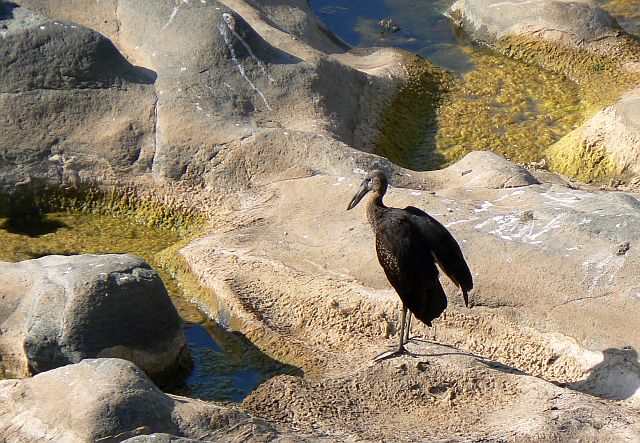 Kruger National Park
Kruger National Park
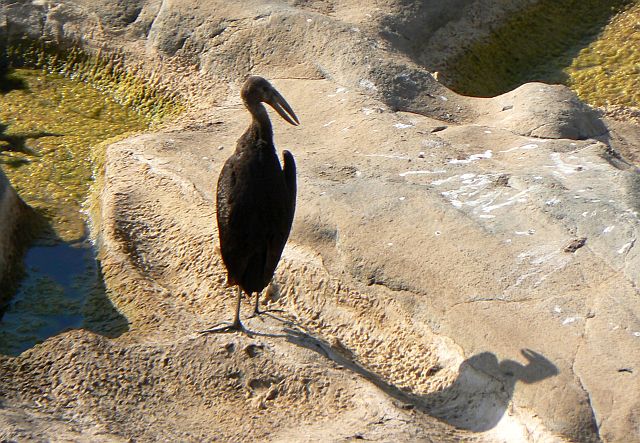 Kruger National Park
Kruger National Park
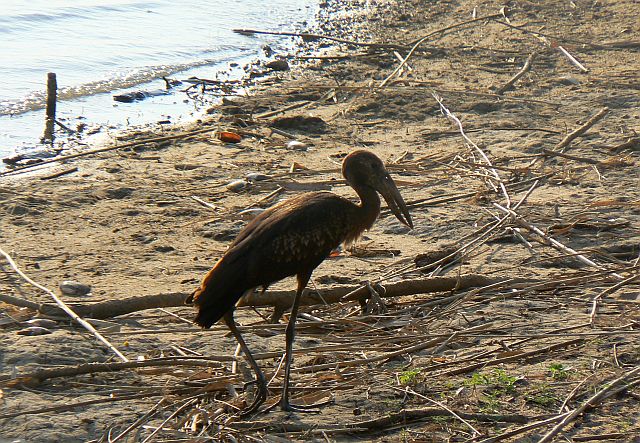 Mkhuze, KZN
Mkhuze, KZN
 Kruger National Park
Kruger National Park Kruger National Park
Kruger National Park Mkhuze, KZN
Mkhuze, KZN



